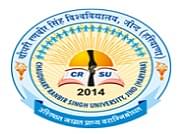Charting a Course for Success: Pursuing a
Bachelor’s in Global Strategy
In today's interconnected world, the ability to think strategically on a
global scale is more critical than ever. Businesses need professionals who can
navigate the complexities of international markets, manage cross-cultural
teams, and develop strategies that account for the diverse economic, political,
and cultural landscapes around the world. A Bachelor's in Global Strategy is
designed to equip students with these essential skills, preparing them for
successful careers in international business. This blog will explore the
admission process, eligibility criteria, and syllabus for a Bachelor’s in
Global Strategy.
Admission Bachelor’s in Global Strategy
The admission process for a Bachelor's in Global Strategy can vary depending
on the institution, but it generally involves several key steps:
1. Application
Form: Prospective students need to fill out an application form, which
is typically available on the university’s website. This form will ask for
basic personal information, educational background, and other relevant details.
2. Academic
Transcripts: Applicants must submit their high school transcripts or
equivalent qualifications. These documents provide evidence of the applicant’s
academic performance and are crucial in the admissions decision-making process.
3. Letters
of Recommendation: Most programs require two or three letters of
recommendation. These should be from teachers, mentors, or professionals who
can attest to the applicant’s academic abilities, character, and potential for
success in the program.
4. Personal
Statement or Essay: A personal statement or essay is a common
requirement. This allows applicants to explain their interest in the program,
their career goals, and why they believe they are a good fit for the
university.
5. Standardized
Test Scores: Some universities may require standardized test scores,
such as the SAT or ACT. International students might need to provide TOEFL or
IELTS scores to demonstrate English language proficiency.
6. Interview:
In some cases, shortlisted candidates may be invited for an interview . This can
be conducted in person, over the phone, or via video conferencing. The
interview helps the admissions committee assess the applicant's suitability for
the program.
Eligibility Bachelor’s in Global Strategy
Eligibility criteria for a Bachelor’s in Global Strategy can vary, but
generally include the following:
1. Educational
Qualifications: Applicants should have completed their high school
education or equivalent. A strong academic record, particularly in subjects
such as economics, business studies, mathematics, and social sciences, is often
preferred.
2. Standardized
Test Scores: Some universities require SAT or ACT scores as part of
the admission process. High scores in these tests can strengthen an
application.
3. English
Proficiency: For non-native English speakers, proficiency in English
must be demonstrated through tests like TOEFL or IELTS. A minimum score
threshold is usually set by the university.
4. Letters
of Recommendation: Strong letters of recommendation from teachers or
professionals who can vouch for the applicant’s academic potential and
character are important.
5. Personal
Statement: A compelling personal statement that outlines the
applicant’s interest in global strategy, career aspirations, and why they are a
good fit for the program.
6. Extracurricular
Activities: Participation in extracurricular activities, especially
those that demonstrate leadership, teamwork, and a global perspective, can be
beneficial.
Syllabus for a Bachelor’s in Global Strategy
The syllabus Bachelor’s in Global Strategy is designed to provide
students with a comprehensive understanding of global business dynamics. While
specific courses and topics can vary by institution, a typical syllabus might
include the following modules:
1. Introduction
to Global Strategy: This course provides an overview of global
business strategies and the various factors that influence them, including
economic, political, and cultural considerations.
2. International
Business Environment: Students examine the international business
environment, including the economic, political, and legal systems of different
countries and how they impact business operations.
3. Global
Marketing Strategies: This course focuses on strategies for marketing
products and services in international markets. Topics include market research,
consumer behavior, and the development of marketing plans.
4. Cross-Cultural
Management: Understanding and managing cultural differences is crucial
in global business. This course covers theories and practices related to
cross-cultural communication, negotiation, and leadership.
5. Global
Supply Chain Management: Students learn about the strategies and
practices for managing global supply chains, including logistics, sourcing, and
production planning.
6. International
Financial Management: This course covers financial decision-making in
a global context, including foreign exchange risk management, international
investment strategies, and global capital markets.
7. Strategic
Management: Students learn frameworks and tools for formulating and
implementing business strategies on a global scale. Case studies of
multinational corporations are often used to illustrate key concepts.
8. Emerging
Markets: This course explores the opportunities and challenges
presented by emerging markets. Topics include market entry strategies, risk
management, and the role of emerging markets in the global economy.
9. Corporate
Social Responsibility and Ethics: Ethical considerations and corporate
social responsibility in international business are the focus of this course.
Students learn about the importance of ethical behavior and sustainable
practices in global business.
10. Capstone
Project: Many programs include a capstone project that allows students
to apply their knowledge to real-world global strategy issues. This project
typically involves research, analysis, and the development of strategic
recommendations for a global business challenge.
Conclusion
Pursuing a Bachelor’s in Global Strategy offers a unique opportunity to gain
the skills and knowledge needed to thrive in the global business environment.
By understanding the admission process, meeting the eligibility
criteria, and familiarizing yourself with the syllabus,
you can prepare effectively for this exciting academic journey.
As the business world continues to globalize, the demand for professionals
with expertise in global strategy will only increase. With the right
preparation and determination, you can embark on a successful career in
international business, equipped to navigate and lead in the dynamic global
marketplace. Whether you aspire to work for a multinational corporation, start
your own international venture, or contribute to global economic development, a
degree in Global Strategy will provide you with the essential tools and
perspectives to achieve your goals.












